|
Looking back
World War II :
The deadliest
human conflict
By now, many of you may be familiar with the numerous special world
days that are being observed in most parts of the globe including our
country as declared by the United Nations (UN). On May 8 and 9, most
countries in the world were called upon by the UN to reflect on one of
the 'deadliest' conflicts in the history of the world; these two days
have been declared as a 'Time of Remembrance and Reconciliation for
those who
|
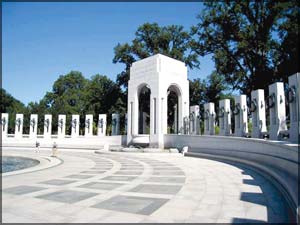
War memorial USA |
lost their lives during the Second World War'. It is noteworthy that
this year these two days coincided with Vesak - the commemoration of the
Birth, Enlightenment and 'Parinibbana of the Buddha, who preached to
mankind of the significance of non-violence, and respect for life, and
also the futility of greed and power. Perhaps, if mankind heeds the
teachings of the Enlightened One and other great spiritual leaders such
as Jesus Christ and Prophet Mohammed, the world would be a better place
to live in and we may never, ever have to witness another global
conflict like the Second World War.
Some of you must have learnt about the two great wars; the First and
the Second World Wars at school for history and even heard your grand
parents talk about certain incidents relating to the Second World War
which also affected our little island nation. In fact, there is hardly
any nation that didn't feel the impact of this global conflict which
left over 70 million people dead. It is considered by many to be the
most widespread war in history. So, let's go back in time and learn more
about this deadly war, the impacts of which are still felt by many
around the world...
Before we delve into the Second World War which is also popularly
referred to as World War II, which lasted from 1939 to 1945, let's focus
briefly on the First World War or World War I, which took place during
1914 to 1918. The event that led to this First World War took place in
Austria and eventually two alliances of powerful European nations
opposed each other and quarrelled for economic and political reasons.
One side were France, Russia and Britain and on the other-Germany,
Austria - Hungary and Italy. The United States joined the war only in
1917. In 1918, the Germans were defeated and on November 11, 1918,
Germany signed the armistice. But, during the four years of war, over 10
million soldiers died. Millions of civilians too died and tremendous
amount of property was damaged.
The First World War ended but, it established dictatorships in
Russia, Italy and Germany. In Russia, the Russians overthrew their
Emperor (the Tsar) even before the war ended in 1917, and the Communists
seised power. In Italy, Benitto Mussolini set up a Fascist government in
1922 and
|
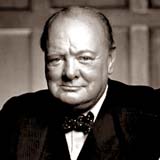
Winston Churchill |
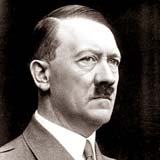
Adolf Hitler |
|

Franklin D. Roosevelt |

Josef Stalin |
|
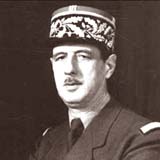
Charles de Gaulle |
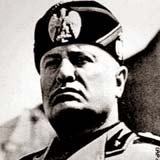
Benito Mussolini |
in Germany, Adolf Hitler led the National Socialist (a Nazi
party). He seized power in 1933 during a worldwide depression. He
rebuilt the German army and announced his intention of taking over the
countries bordering Germany. And he did so by joining Austria to Germany
in 1938 and also Czechoslovakia in 1939.
In this same year (1939) on September 1, Hitler invaded Poland
without warning, triggering off another global military conflict. By
September 3, both Britain and France were at war with Germany. Within a
week, Australia, New Zealand, Canada and Africa joined. The great powers
and a majority of other nations involved in the war formed two opposing
alliance - the Allies and the Axis.
The Allies comprised France, Britain and the US (three major powers)
and all countries under the British Empire. In the opposing side,
supporting Germany were Italy and Japan.
With over million military personnel mobilised to fight in the war,
battles raged on air, land and sea.
In April, 1940, Germany suddenly struck Norway and Denmark and
defeated both countries. Then on May 10, 1940 the Germans invaded
France, Belgium, the Netherlands and Luxembourg. And, in less than 40
days, Adolf Hitler and his army defeated France. This left only Great
Britain to oppose Germany.
Then in his thirst for power, Hitler invaded the Soviet Union in
1941. It then ended up fighting Great Britain and the Soviet Union. By
this time, the United States was not directly involved in the war. It
was only providing military aid to Britain, but it entered the war when
Japan, an ally of Germany, bombed the American naval base at Pearl
Harbour in Hawaii on December 7, 1941.
This attack on Pearl Harbour shunned the nation. It caused heavy
casualties in lives, property and aeroplanes.When the United States
declared war on Japan on December 8, 1941, Germany and Italy then
declared war on the United States.
The war spread throughout the world covering Europe, the Pacific,
South East Asia, China, the Mediterranean and Africa. According to
estimates, nearly 70 million people are believed to have died in this
war. In Asia the death toll is reported to be 30,296,400 (both civilians
and military personnel) and in Europe the total is put at 41,950,000.
More people died on the Allied side than on the opposing side.However,
by 1944, the stage was set for the defeat of Germany and its allies. On
June 6, 1944, the British and American troops landed on the coast of
Normandy to fight the Germans. Popularly called D-Day, it was the
beginning of the liberation of occupied Europe.On April 30, 1945, Hitler
committed suicide and Germany surrendered on May 7.
The war which raged over six years(1939-1945)finally ended with the
use of nuclear weapons. The day this great war ended is recorded as the
day Germany surrended (May 7, 1945), but some consider it to be the day
the Armistice was signed - that is August 14, 1945.
The Second World War ended with the Soviet United and the Union
States of America emerging as Super Powers. And, this set the stage for
the Cold War which lasted the next 45 years.
The entire world did not want to see another such dreadful war being
waged so, the United Nations was established to prevent such a massive
global conflict from ever taking place. They've succeeded so far in
ensuring this but, would there be a Third World War in the future? Let's
hope not!
**************
Fact file
* Adolf Hitler was appointed Reichsknazler (Chancellor) of Germany on
January 30, 1933.
* The leaders of the three major Axis countries were Germany - (Nazi
leader) Adolf Hitler. Italy - Prime Minister Benito Mussolini and Japan
- Prime Minister, Tojo Hideki.
* The leaders of the Allied nations were - Russia - Josef Stalin
England - Prime Minister Winston Churchill.
U.S.A- President Franklin D. Roosevelt.
France - Charles de Gaulle.
China - Sun Yat Sen.
* Majority of the civilians died during the Second World War due to
diseases, starvation, massacre, bombardments and genocide.
* Hitler's police - Gestapo and the SS arrested, tortured and
imprisoned in concentration camps millions of men, women and children.
The Nazis are believed to have killed six million jews, two million
ethnic Poles, and four million others deemed as unworthy of life.
* Total military dead is around 25 million. Civilians killed totalled
around 47 million including 20 million from war-related diseases.
* Axis death toll is about 11 million while Allied death toll is
about 61 million.
* The war ended when United States dropped atomic bombs on Hiroshima
and Nagasaki in Japan.
* The Cold War was the name of the political and economic rivalry
that began after the war between the two super powers.
Facts and pix:
Internet and Children's Fact Finder
************** |

